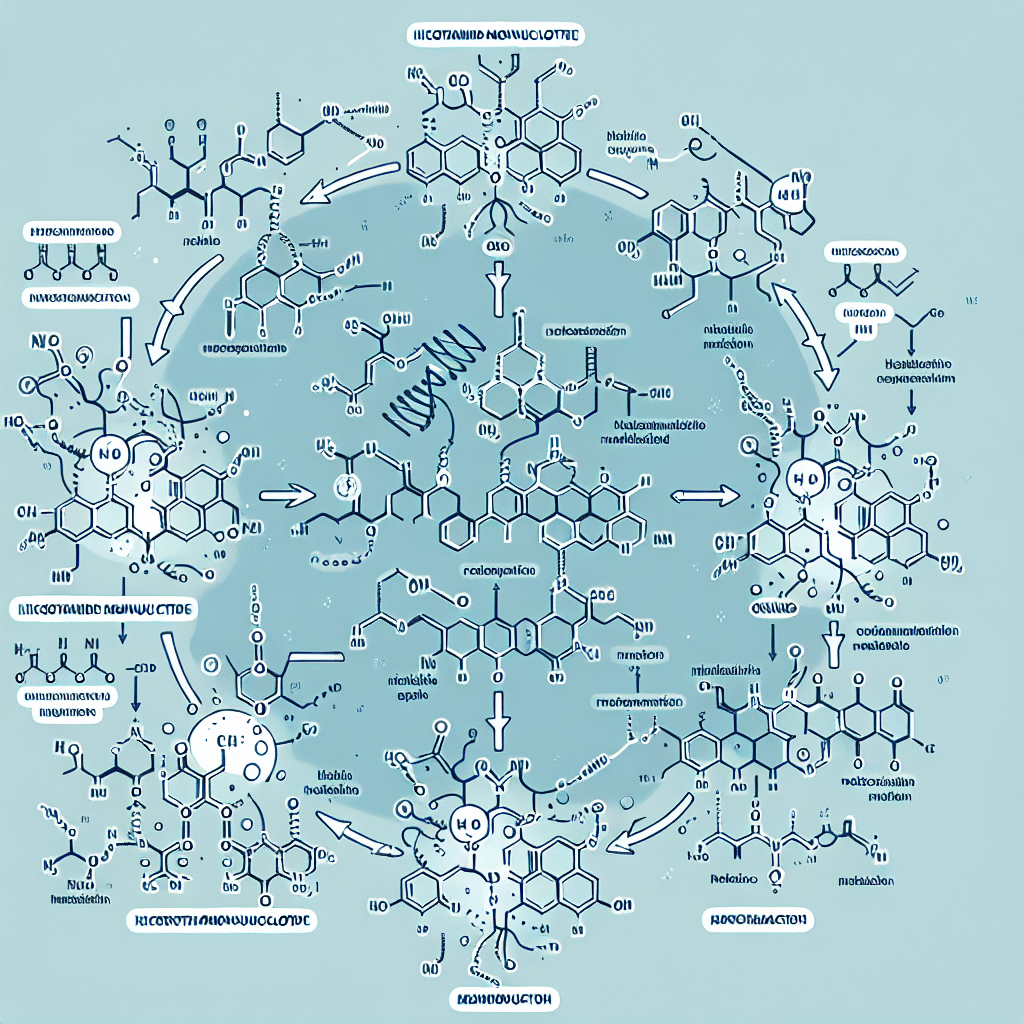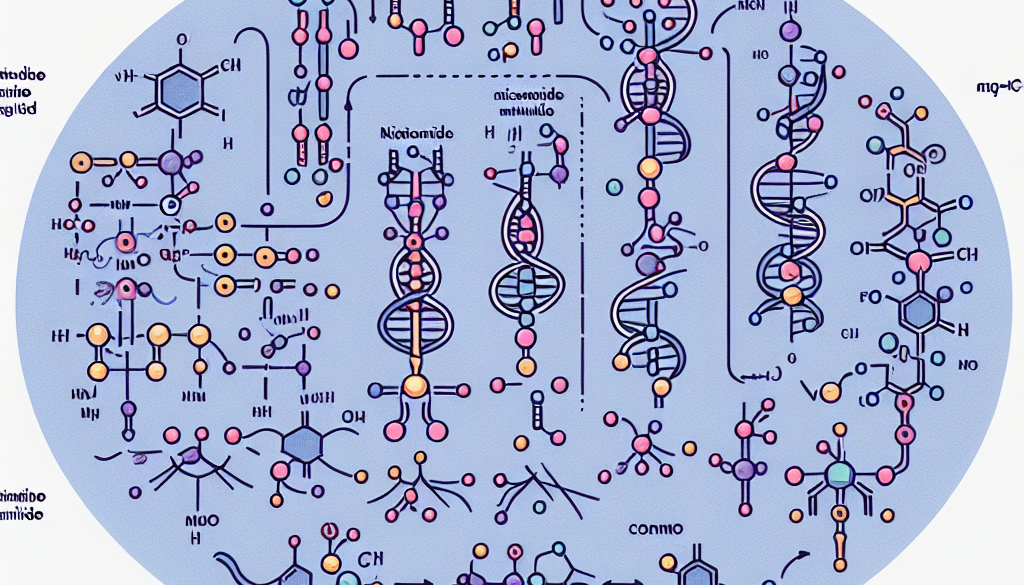Nicotinamide Mononucleotide Metabolism: How It Works
-
Table of Contents
- Nicotinamide Mononucleotide (NMN) Metabolism: Unveiling the Mechanisms
- Understanding NMN and Its Importance
- The NMN Metabolic Pathway
- Enzymes Involved in NMN Metabolism
- Therapeutic Potential of NMN
- Case Studies and Research Findings
- Statistics and Current Trends
- Conclusion: Key Takeaways on NMN Metabolism
- Enhance Your Health with ETprotein’s Protein Products
Nicotinamide Mononucleotide (NMN) Metabolism: Unveiling the Mechanisms

Nicotinamide mononucleotide (NMN) has garnered significant attention in the scientific community for its role in cellular metabolism and potential anti-aging effects. Understanding how NMN metabolism works is crucial for comprehending its impact on human health and longevity. This article delves into the intricacies of NMN metabolism, exploring the pathways, enzymes involved, and the implications for therapeutic interventions.
Understanding NMN and Its Importance
Nicotinamide mononucleotide is a nucleotide derived from ribose and nicotinamide. As a precursor to nicotinamide adenine dinucleotide (NAD+), a vital coenzyme found in all living cells, NMN plays a significant role in various biological processes, including energy production, DNA repair, and gene expression. The decline of NAD+ levels with age is associated with a range of age-related diseases, which positions NMN as a potential anti-aging molecule.
The NMN Metabolic Pathway
The metabolism of NMN is a complex process involving several steps and enzymes. Here’s a breakdown of the key stages:
- Nicotinamide Riboside Kinase Pathway: NMN is synthesized from nicotinamide riboside (NR) through the action of nicotinamide riboside kinases (NRK1 and NRK2).
- De Novo Pathway: NMN can also be produced from tryptophan or aspartic acid through the de novo pathway, which is a more complex and less direct route.
- Salvage Pathway: The salvage pathway recycles nicotinamide (NAM), a byproduct of NAD+ consumption, back into NMN and ultimately NAD+.
Once NMN is formed, it is converted into NAD+ through the action of the enzyme NMN adenylyltransferase (NMNAT), which is present in three isoforms (NMNAT1-3) in different cellular compartments.
Enzymes Involved in NMN Metabolism
The conversion of NMN to NAD+ is facilitated by a series of enzymes that regulate the availability and efficiency of this process. Key enzymes include:
- Nicotinamide Riboside Kinases (NRK1/2): These enzymes phosphorylate NR to NMN.
- NMN Adenylyltransferases (NMNAT1-3): These enzymes are responsible for the final step of NAD+ synthesis from NMN.
- Nicotinamide Phosphoribosyltransferase (NAMPT): This rate-limiting enzyme in the salvage pathway converts NAM to NMN.
Understanding the activity and regulation of these enzymes is crucial for developing strategies to enhance NAD+ levels in the body.
Therapeutic Potential of NMN
The therapeutic potential of NMN supplementation lies in its ability to boost NAD+ levels, which may have various health benefits:
- Anti-Aging Effects: By replenishing NAD+ levels, NMN can potentially mitigate age-related decline in cellular function.
- Metabolic Disorders: NMN has been shown to improve insulin sensitivity and lipid profiles in preclinical models of metabolic disorders.
- Neuroprotection: NMN may protect against neurodegenerative diseases by supporting neuronal energy metabolism and DNA repair mechanisms.
- Cardiovascular Health: NMN could help maintain healthy blood vessels and improve cardiovascular function.
While promising, more research is needed to fully understand the long-term effects and optimal dosing of NMN in humans.
Case Studies and Research Findings
Several studies have highlighted the benefits of NMN supplementation:
- A study in mice demonstrated that NMN supplementation improved age-associated metabolic decline and extended lifespan.
- Human trials have shown that NMN can increase NAD+ levels in the blood, suggesting potential health benefits.
These findings support the potential of NMN as a therapeutic agent, but further research is necessary to translate these benefits to clinical practice.
Statistics and Current Trends
The market for NMN supplements has been growing, driven by increasing consumer interest in anti-aging and wellness. According to recent reports, the global NMN supplement market is expected to expand significantly in the coming years, reflecting the compound’s popularity and potential health benefits.
Conclusion: Key Takeaways on NMN Metabolism
Nicotinamide mononucleotide metabolism is a critical process that contributes to maintaining cellular NAD+ levels and overall health. The enzymes involved in NMN metabolism are potential targets for therapeutic interventions aimed at combating age-related diseases. While NMN supplementation shows promise, more research is needed to establish its efficacy and safety in humans.
Enhance Your Health with ETprotein’s Protein Products
If you’re looking to support your health and wellness goals, consider incorporating ETprotein’s high-quality protein products into your routine. ETprotein offers a range of organic bulk vegan proteins that are non-GMO, allergen-free, and characterized by a neutral taste. Their products cater to various industries, ensuring comprehensive solutions for your protein needs.
About ETprotein:
ETprotein, a reputable protein and L-(+)-Ergothioneine (EGT) Chinese factory manufacturer and supplier, is renowned for producing, stocking, exporting, and delivering the highest quality organic bulk vegan proteins and L-(+)-Ergothioneine. They include Organic rice protein, clear rice protein, pea protein, clear pea protein, watermelon seed protein, pumpkin seed protein, sunflower seed protein, mung bean protein, peanut protein, and L-(+)-Ergothioneine EGT Pharmaceutical grade, L-(+)-Ergothioneine EGT food grade, L-(+)-Ergothioneine EGT cosmetic grade, L-(+)-Ergothioneine EGT reference grade and L-(+)-Ergothioneine EGT standard. Their offerings, characterized by a neutral taste, non-GMO, allergen-free attributes, with L-(+)-Ergothioneine purity over 98%, 99%, cater to a diverse range of industries. They serve nutraceutical, pharmaceutical, cosmeceutical, veterinary, as well as food and beverage finished product distributors, traders, and manufacturers across Europe, USA, Canada, Australia, Thailand, Japan, Korea, Brazil, and Chile, among others.
ETprotein specialization includes exporting and delivering tailor-made protein powder and finished nutritional supplements. Their extensive product range covers sectors like Food and Beverage, Sports Nutrition, Weight Management, Dietary Supplements, Health and Wellness Products, and Infant Formula, ensuring comprehensive solutions to meet all your protein needs.
As a trusted company by leading global food and beverage brands and Fortune 500 companies, ETprotein reinforces China’s reputation in the global arena. For more information or to sample their products, please contact them and email sales(at)ETprotein.com today.














